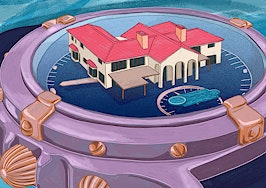This is the first article in a five-part series on open houses that will run between Monday, November 11 and Friday, November 15. Read part two here.
About a decade ago, Toronto real estate agent John Fortney was tasked with selling a duplex in one of his city’s trendiest neighborhoods. It was a good property, and Fortney knew buyers would like it, so he did what a lot of agents do: He held an open house.

John Fortney
But Fortney’s was no ordinary open house. Instead, he showed up at the property, and promptly locked the door. And that meant anyone who wanted to get inside would have to wait for Fortney to personally let them in for a semi-personal showing.
The experiment worked.
“I had 500 people and they were lined up and down the street,” he told Inman. “I knew it was going to be a great turn out, I knew it was going to be a busy open house. But it was like, ‘Oh my God.”
The property ultimately received multiple offers and sold within the week, well over its asking price.
Fortney’s experience highlights the power of a well-executed open house. It drummed up publicity. It gave would-be buyers a sense of their competition. It ultimately helped sell the listing.
But the anecdote also illustrates how the open house — one of the most time-honored traditions in the business — is under increasing pressure. In Fortney’s case, locking the doors represented a kind of evolutionary leap forward, turning the “open” house into something a lot less open and a lot more exclusive.
Some other agents, though, are less interested in evolving the form than in simply moving beyond it. In agent forums, in news article comments sections and at industry gatherings a question keeps coming up: Are open houses actually worth doing any more at all?
It’s not a question that has a single easy answer; there are nearly 1.4 million members of the National Association of Realtors (NAR), and probably almost as many opinions on the topic. And there’s no question that open houses remain popular in many places.
Still, recent data as well as conversations Inman conducted with more than a dozen agents suggests that, at least for some, the open house is going the way of the dinosaur.
The limited appeal of the open house
The modern iteration of the open house has been evolving for about 100 years, when in 1919 licensing laws began limiting who could call themselves a broker. Over the ensuing decades, a kind of survival-of-the-fittest process winnowed the practice into what it is today.
But data shows that the practice is far from universal.
Specifically, a new report out this month from the National Association of Realtors shows that only 4 percent of all homebuyers visited open houses as their first step in the purchase process. Perhaps more ominously for the practice, 5 percent of buyers over 65 used an open house as their first step, but only 2 percent of buyers between 18 and 24 did the same — suggesting the practice may have less appeal to up-and coming generations.

NAR research shows that while homebuyers frequently search the internet, their reliance on open houses for information is much lower. Credit: NAR
Additionally NAR found that only 14 percent of buyers “frequently” turn to open houses as a source of information. A much larger percentage of buyers — 51 percent — used open houses generally, though that figure suggests open houses are far from universally relied on.
NAR further found that only 40 percent of buyers found open houses to be “very useful.”

Credit: NAR
Given those consumer behaviors it should come as no surprise, then, that some agents are skeptical about the utility of open houses.

Marc Cassens
Marc Cassens, a Realty Experts agent in Oklahoma, is among those skeptics and told Inman that these days he “very rarely” holds an open house. And when he does, it’s typically, just to “pacify the owners.”
“I just don’t see them as being that productive,” he said.
Jen Geisinger, an agent at a boutique brokerage in Minnesota’s Twin Cities region, had a similar perspective.

Jen Geisinger
“I don’t think it’s necessary and I’m not a big proponent of it,” she told Inman. “I don’t do them.”
Overall, the real estate professionals who spoke to Inman for this story were divided on the issue. But whatever their personal feelings, they largely agreed there is a contingent within the industry that avoids open houses.
Jim Weix, an agent in south Florida, said that in his area many agents see open houses as a waste of time. Weix isn’t one of those agents — open houses are an integral part of his sales strategy — but he believes the anti-open house group is large.

Jim Weix
“I would say it’s probably a majority who don’t do open houses unless they absolutely have to,” he told Inman. “In the area where I live, it’s pretty much the same agents doing all the open houses.”
Data appears to support Weix’s suspicion.
In 2016, real estate referral and transaction management startup HomeLight surveyed 133 top agents and found that only 37 percent always recommend holding open houses to their sellers.

Credit: HomeLight
HomeLight additionally found that “most agents also swung towards the ‘completely useless’ end of the open house spectrum.” On a scale of zero to 10, with zero being useless and 10 being essential, more than half of the surveyed agents ranked open houses lower than a five.

Credit: HomeLight
Agents like Cassens have also found themselves inching further and further into the “completely useless” open house faction over the years as the industry itself changes.
“I think they are less productive in existing homes than they used to be, mostly because so many people are able to shop online now,” he argued.
The case against open houses
If it’s clear that a significant group of agents don’t see open houses as useful, that fact begs a question: why?
The answer, according to many agents who spoke to Inman, is that open houses just aren’t actually good at serving the property owners who throw their doors open to the public — which at least in the popular conception (if not the minds of many agents) is the point.
“I don’t think they are effective for selling a house,” Geisinger argued.
That’s a sentiment that has existed in the industry for a long time. All the way back in 1998, Texas A&M University conducted a study on the topic and found that only 41 percent of agents actually thought an open house helps sell a property.
More than two decades later, the view that open houses don’t sell homes remains common.
“The answer to that question would be no,” Weix said when asked if open houses actually sell properties. “If your goal at the open house is to sit in the home and have somebody walk in and say, ‘I want to buy this house,’ the chance of that happening is small.”
“I don’t think it happens much,” Cassens said when asked the same question. “It does happen, but I’ve probably only sold five over my career that way. And I’ve been doing this for 27 years.”

Jay Thompson
“I personally don’t think so,” Jay Thompson, a broker and real estate writer, replied to the question about open houses and sales. “They’re crappy for the seller because they’re inconvenient.”
Thompson’s argument highlights a sentiment that’s common among open house skeptics: Agents have a responsibility to their sellers, but holding an open house rarely translates into offers. And it’s a burden; at the very least, sellers have to leave their homes and hope nothing happens as a parade of strangers strolls through.
“It’s a big giant pain in the ass for the homeowner,” Thompson added.
Thompson also said that concerns about safety and crime are a major concern when it comes to open houses today.
Inman will dive into the safety issues surrounding open houses in the next installment of this series, but suffice it to say here that agent concerns about safety was a recurring theme during conversations for this story. If there is one thing beyond concerns about effectiveness that’s driving the agents who spoke with Inman to abandon open houses, it’s safety issues.
The case for open houses
Of course, for every agent that avoids open houses there’s another that holds them regularly. And the arguments in favor of the practice are varied.

Mary Gillach
“It depends on where you are in the country, but in our region, open houses are really mandatory,” Mary Gillach, a team leader at William Raveis Real Estate in the Boston area, told Inman.
“I think it’s definitely helpful,” James McGrath, co-founder of New York City brokerage Yoreevo, said.
“I think open houses are really important,” Michael Repka, CEO of DeLeon Realty in California’s Bay Area, added.

Michael Repka
Repka went on to say that where he works in Silicon Valley, many consumers are tech-savvy and independent-minded.
“In Silicon valley people like to find the homes on their own,” he said, explaining that open houses create a chance to do just that.
McGrath argued that open houses offer a chance to test a listing’s price — if no one shows up it’s too high — and allow “you to concentrate” effort into a short amount of time.

James McGrath
“People tend to be pretty busy during the week here,” he continued. “If you do open houses it helps manage everybody’s time. And there’s no friction.”
The list of arguments in favor of open houses could go on, but if you’ve read this far you already probably know what the biggest one is: leads.
“Where do you meet a $2 million buyer?” Gillach asked. “You’re going to meet a $2 million buyer at a $2 million open house.”
Pretty much everyone who spoke to Inman agreed that meeting new potential clients is kind of the point.
“I hold an open house for two reasons,” Weix said. “One is to meet potential buyers, though not necessarily of that house. And two is to meet the neighbors.”
“From a lead perspective,” McGrath said, “you can certainly get people earlier in the funnel at an open house.”
This view is sufficiently widespread and well-understood — agents on both sides of the issue mentioned it — that it hardly needs harping on here. The question is really just if the lead generation benefits of an open house outweigh any potential drawbacks.
The agents who regularly hold open houses argued the pros do outweigh the cons.
“There’s no better place to meet someone than at an open house,” Gillach said.
The skeptics argued the opposite.
“We work hard during the week,” Geisinger countered. “To sit in an open house for two or three hours on a Sunday, I’d rather be at home for those hours. I don’t think that the open house is the best way to spend our time.”
This debate isn’t going to be settled here and now, but Geisinger, among others, said open houses have actually become less productive over the course of their careers — and that, as a result, “they’re kind of falling by the wayside.”
“When I started 15 years ago, less than 1 percent of homes sold to someone who walked through the open house,” she said. “I have no doubt that number would be lower now.”
Tomorrow: Are open houses too dangerous to justify?












